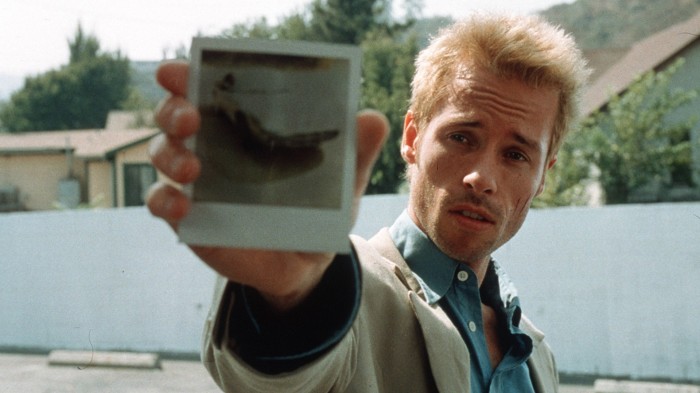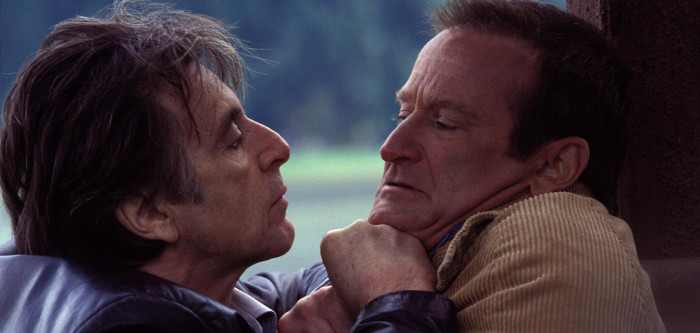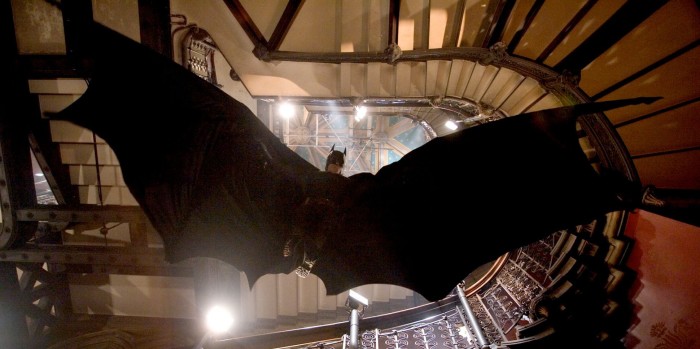Why Christopher Nolan Was The Quintessential Filmmaker Of The 2000s
If you held an elimination tournament to determine the movie director who was best representative of the 2000s, there are many names that might make it into the final round. Taste is subjective, of course, but by now there is enough distance between us and the decade that we should be able to look back on it with a degree of clarity.
Going by the criteria of the National Film Registry — whereby motion pictures are evaluated as "culturally, historically, or aesthetically significant" — there is one director whose total output in the 2000s (including teaser trailers for 2010 films) arguably had the most pervasive influence. You would not have to be a "Nolanite" to make a strong case for Christopher Nolan being that director.
Nolan's influence can indeed be felt culturally, historically, and aesthetically, with the director's popularity among critics and general audiences being bolstered by his impact on commercial Hollywood and the artistic methods of other filmmakers. Since his filmography already provides a good framework, let's move through the decade chronologically, taking a look at each of Nolan's films, and how they contributed to his evolution as the quintessential filmmaker of the 2000s.
Memento (2000)
Quentin Tarantino may have owned the 1990s, but at the outset of the new millennium, the poster boy for independent cinema was in the middle of a six-year limbo period. In 2000, however, two new filmmakers popped up with daring sophomore features to fill the void left by Tarantino's absence. One was Darren Aronofsky; the other was Christopher Nolan.
The arrival of Requiem for a Dream and Memento heralded Aronofsky and Nolan as breakthrough talents whose names held enough interest for movie fans that even their lesser-known first features, Pi and Following, started showing up on the shelves at Blockbuster Video.
For its part, Memento earned standing ovations at film festivals, and by the time it expanded from 11 to 500 theaters in the U.S., word-of-mouth had already established it as something of an instant classic. The way it played with narrative structure, its use of non-linear chapters, had film-lovers mentioning it in the same breath as Pulp Fiction.
Yet Memento was very much its own thing: employing, as it did, the high concept of short-term memory loss to tell a story backwards. Part of what gives Nolan's films such resonance is their thematic depth. With Memento, the mystery unfurled into a parable about self-deception.
The film earned an Oscar nomination for Best Original Screenplay, and within a few years, professors would be integrating Memento into college courses. Even if Nolan had not gone on to have the career that he did later, this film, in and of itself, would still be a milestone. As it is, Memento immediately gave him artistic credibility; but unlike Nicolas Winding Refn after Drive, Nolan was able to capitalize on that in a way that would sustain critical acclaim.
Meanwhile, it was Aronofsky's name that first became attached to the fifth entry in the Batman film franchise, a project called Batman: Year One, which he was co-writing with Frank Miller, based on Miller's comic book storyline of the same name. Aronofsky even courted Christian Bale to play the lead, but the project soon fell through, leaving this Nolan contemporary with a six-year gap in his filmography, much like Tarantino.
Insomnia (2002)
While Insomnia is probably the least invoked Nolan film of the 2000s, perhaps its very significance lies in the tendency people have to disregard it. Studio bosses would do well to remember Insomnia. This is the all-important bridge film, the one that allowed Nolan to cut his teeth on a feature with a mid-level budget. Nolan commented on this once in a THR interview, talking about how he moved from a "little indie film" to a "medium-sized studio film" before he ever dared to take on a character as beloved as Batman.
In its rush to repeat the success of the Nolan model, Hollywood often skips this step, drafting independent filmmakers straight up from the minor leagues, into the world of big-budget tentpole features. Part of the problem is that the "medium-sized studio film" is disappearing, in favor of peak TV and simultaneous releases. Yet this does not change the fact that having young untested directors like Josh Trank or Marc Webb at the helm of tentpole features often leads to production problems.
For Nolan, Insomnia marked a transitional step, one that enabled him to hone his craft and add to his pedigree while adjusting to the pressures of working inside the studio system with movie stars like Al Pacino. Here again, the budding auteur would play with memory, with flashes of recollection informing key moments in the film, such as the tensely edited scene where a character recounts the details of a murder over the phone.
As our own Josh Spiegel recently pointed out, Nolan had the foresight to cast the late comedian Robin Williams against type: a move echoed by director Mark Romanek, who wrangled a similarly disquieting performance out of Williams for a film called One Hour Photo, which would hit theaters later in 2002. Fifteen years later, Insomnia remains one of Nolan's highest rated films on Rotten Tomatoes.
Batman Begins (2005)
The importance of Batman Begins cannot be overstated. In the same way that Jaws and Star Wars gave us the summer blockbuster back in the 1970s, Batman Begins is the film that jumpstarted the Hollywood reboot-o-tron in the mid-2000s. In that respect, you could argue that its success may have even been more influential on the film industry than that of The Dark Knight.
In the 1990s, director Joel Schumacher had made a mockery of the Caped Crusader, putting nipples on Bat-suits and running the franchise into the ground with Batman & Robin. But Nolan was able to redeem the franchise in a way no one knew possible. For better or for worse, Hollywood latched onto this as a business strategy, seeing that it could repackage the same intellectual properties, over and over.
The year after Batman Begins, we got Casino Royale, which effectively gave James Bond the same reboot treatment, rescuing him from the ignominy of Die Another Day. And Hollywood has been off to the reboot races ever since.
Batman Begins also did something remarkable for its time in that it helped turn the tide for superhero films, giving them an air of legitimacy, even perhaps showing that they could function as high art. In the early 2000s, the comic book movie genre was still finding its footing, going through a lot of growing pains. Attempts at bringing Marvel characters to the big screen frequently resulted in dismal Tomatometer scores. By today's standards, the most notable gem from that era would probably be Spider-Man 2.
Nolan raised the bar. In addition to situating his film more firmly in the real world, Nolan stacked his cast with serious dramatic actors, Oscar nominees and Oscar winners. Inspired by his example, director Jon Favreau would utilize the same approach for Iron Man, the film that birthed the Marvel Cinematic Universe. In the meantime, this is also when Nolan started collaborating with Hans Zimmer, the composer he called "the sound of contemporary movies."
Marshaling his talented forces, Nolan managed to deliver what is arguably the definitive origin story, across all mediums, for the greatest superhero of all time. Even in comic books, Batman's full, mythic origin had never been told in such a sincerely Batman-centric way before. The closest thing would have probably been Frank Miller's aforementioned Batman: Year One, part of the source material for Batman Begins. But if you go back and read it, that story belonged as much to Detective Jim Gordon, if not more so.
Say what you will about his gruff Batman voice, but with his extreme physical dedication as an actor, Christian Bale was the perfect Bruce Wayne. Up until Bale donned the Batman cowl, we had never gotten to see Bruce Wayne go through his training to become what Kingdom Come writer Mark Waid called "the zenith of human fortitude and ambition."
The franchise that did exist around the character was really more a celebration of scene-chewing villains. In 1989, Jack Nicholson famously received top billing over Michael Keaton. As good as Keaton looked in that first Batman suit, there was always the nagging sense that he and subsequent actors were just there to play the boring straight man for whatever zany member of Batman's rogues gallery popped up next.
Bale's Bruce Wayne changed all that, restoring dignity to the Dark Knight, by allowing the most human and relatable of all superheroes to carry his own movie, in which the villains were only supporting characters. With Nolan at the helm, this movie would revive the potency of the modern myth of Batman.
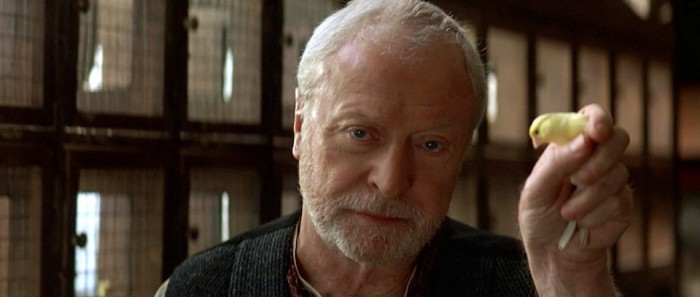
The Prestige (2006)
Like Memento, The Prestige was a film that featured on many best-of-the-decade lists. It showed Nolan and Bale operating outside their new Batman wheelhouse as one of the most noteworthy director-and-actor collaborations of the decade. By the end of the 2000s, Martin Scorsese and Leonardo DiCaprio would only be two films into their collaboration. Nolan and Bale, on the other hand, would have three landmark films under their belt.
Listeners to the /Filmcast will recognize The Prestige as the film that has furnished the well-worn audio clip that plays before the spoilers section of every episode. "Now you're looking for the secret," begins the voice of Michael Caine.
At its heart, The Prestige is a movie about show business and dysfunctional creative people, conjurers of art who compete with each other and are ultimately consumed by personal jealousy, petty professional rivalry, and their own fractured relationship with themselves and the world around them.
Bale's magician is the serious craftsman, who lives a life so supremely dedicated to uncompromising art that it costs him in the end. For his part, Hugh Jackman's magician is the more audience-friendly showman, who kills a little piece of himself every night he goes up on stage in front of a large crowd. It happens over and over, with him losing facsimiles of himself to the audience, again and again, as if he were a person trapped in some unstoppable copy machine. Eventually there is no soul left in him at all, just echoes of the person he once was, floating ethereally in a burning theater.
In his own filmography, Nolan has struck a delicate balance between the work of a serious craftsman, and the work of an audience-friendly showman.
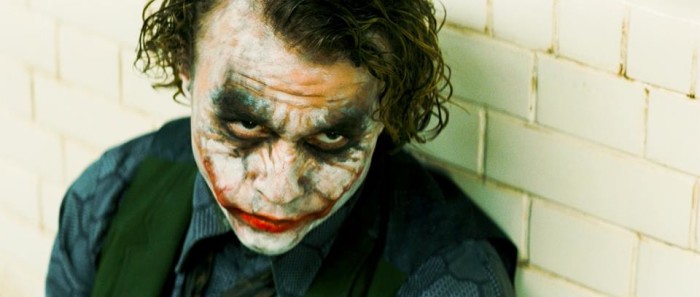
The Dark Knight (2008)
The Dark Knight, of course, is The Godfather of geek movies. This is where Nolan soared into the stratosphere, cementing himself as the quintessential filmmaker of the 2000s. Together with Batman Begins, The Dark Knight set the template for gritty realism, not only in comic book movies, but in a whole host of other forgettable films.
How many times in movies news stories did we hear that there was going to be a "dark" or "gritty" take, or a Trek Into Darkness, with a film being developed?
Nolan's influence extends well beyond those who cribbed from it. Storywise, The Dark Knight spawned countless imitators, with even good films like Skyfall and The Avengers taking a cue from Nolan's playbook of having a villain who "planned to get caught" glare out from his cell, before escaping to sow further mischief. As the chief villain here says: "I'm an agent of chaos."
The inclusion of an iconic baddie like the Joker, coupled with the unfortunate passing of Heath Ledger, created a perfect storm scenario whereby a 2-D crime drama was able to become a billion-dollar cultural phenomenon that inspired legions of cosplayers.
To a generation of fans, Ledger became the new James Dean. When he was first cast in the role, it left some naysayers wringing their hands. But in the end, Ledger's performance not only eclipsed Jack Nicholson's; it would ensure him a place in the upper echelon of great movie villains, alongside Darth Vader and Hannibal Lecter. His posthumous Oscar win for Best Supporting Actor, along with the film's weighty themes, helped it transcend the comic book movie genre—while at the same time elevating the genre to new levels of seriousness as an art form.
Never has the Joker been more gleefully Satanic than the scene where he appears at Harvey Dent's hospital bedside, whispering in Dent's ear, playing the part of the tempter, so he can win the battle for one man's soul, and with it, Gotham City. Batman becomes a Christ figure, the Hebrew scapegoat made human, sacrificing himself for the sins of others.
Infused with similar religious themes, films like this year's Logan are now more like dark dramas than standard superhero flicks. When The Dark Knight got snubbed for a Best Picture nomination in 2008, the Academy even went and expanded the category the next year, to allow for extra nominations. That speaks volumes.
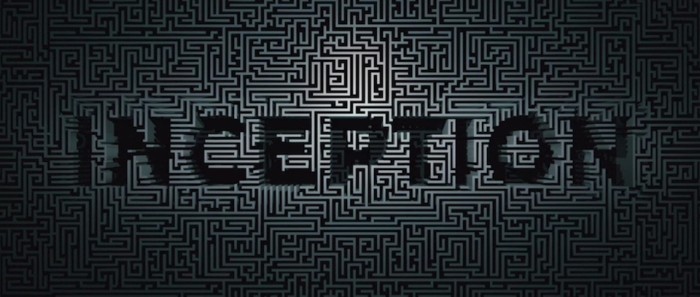
Inception (2010)
After The Dark Knight, the name Nolan had become a brand unto itself. In the summer of '09, when the first teaser for Inception was released, the first thing that popped up on screen after the Warner Bros. logo were the words, "From Christopher Nolan." There was no need to identify him as the director of [such-and-such a film]. Just his name was enough. Fans were already calling themselves Nolanites and proclaiming "In Nolan We Trust." By now Nolan, with Zimmer as his new go-to composer, wielded enough influence that just the teaser for one of their movies could be a trendsetter.
Thank you, Hans, for all those braaams. Braaams were the gift that kept on giving.
https://www.youtube.com/watch?v=_5VDKVqvo8M
Speaking of 2009, while The Lord of the Rings trilogy might make the 2000s seem like a real toss-up between Nolan and Peter Jackson, 2009 changed all that, as Jackson began to fall out of favor that year with The Lovely Bones. The 2000s were a slow decade for David Fincher; likewise with Paul Thomas Anderson.
Ultimately, you do not have to cherish the films of Christopher Nolan. You may even think (as this writer does) that the Nolan brand started to show some chinks in its armor with The Dark Knight Rises and Interstellar. But there is no denying his far-reaching impact in the 2000s. Pit his filmography that decade against that of any other director, and it would be Christopher Nolan, for the win.

